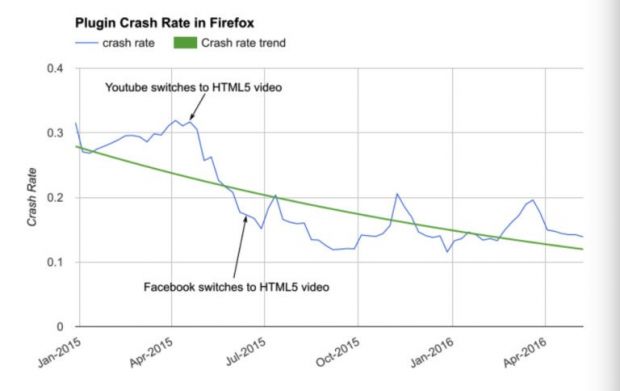Starting next month, Mozilla plans to block all non-essential Flash content inside Firefox, as it continues its effort to untangle its browser and the regular Web user from the crash-prone and insecure plugin.
By non-essential content, Mozilla is referring to small Flash objects (SWF) files that are not visible to the user, usually employed by advertising companies and used to fingerprint and track users.
Things are going to change dramatically in 2017, when the Foundation intends to make Flash a "click-to-activate" plugin. Users will have to approve Flash to run on each site they visit, which is something that Google is planning to introduce for Chrome in Q4 2016, albeit some websites will be excluded and be allowed to run content via Flash primarily.
Firefox now includes JavaScript APIs as alternatives to Flash features
Mozilla's Benjamin Smedberg justified the Foundation's decision by saying that this is the time to do it. Advances in Web technologies have now made it possible to run content that previously needed Flash to execute.
Furthermore, he says Mozilla has been at the forefront of integrating such technologies in Firefox.
This includes the Intersection Observer API for detecting if an object is currently viewable on the page, but also other APIs for interacting with the OS clipboard, running 2D and 3D graphics, real-time communications, camera access, microphone access, and support for real-time streaming of audio and video content. For almost two decades, for all these features, users would have needed a plugin like Flash.
Removing Flash must be done for the sake of speed and performance
Firefox's expanding support for modern Web technologies isn't the only reason Mozilla chose this route.
The Foundation ties YouTube's and Facebook's switch to using HTML5 video by default to a decrease in the number of Flash plugin crashes.
Untangling Flash from Firefox is a priority for Mozilla, which is on a mission to reforge Firefox into a sleek and fast browser via new technologies like Rust code, WebExtensions, e10s, and more.
Previously, Google, Apple, and Microsoft alike implemented similar features to prevent non-essential Flash content from starting in their browsers, Chrome, Safari, and Edge.

 14 DAY TRIAL //
14 DAY TRIAL // 

